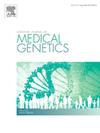Kleefstra综合征的父母经历和需求:一项半结构化访谈研究。
IF 1.7
4区 医学
Q3 GENETICS & HEREDITY
引用次数: 0
摘要
Kleefstra综合征(KLEFS1)是一种以发育迟缓、躯体问题和(神经)精神症状为特征的单基因神经发育障碍。患有KLEFS1的个体通常需要复杂的、持续的支持,这对家庭生活产生了重大影响。为了有效地改善对家庭的照顾和支持,需要更好地了解抚养患有KLEFS1的儿童对家庭和家庭支持需求的影响。我们对KLEFS1儿童的父母进行了一项半结构化访谈研究,以调查这些影响。这些采访被录音、转录、编码,并进行主题分析。我们在荷兰和比利时对15位KLEFS1儿童(8-25岁)的父母进行了12次访谈。多年来,父母们遇到了巨大的挑战。虽然父母重视及时诊断,但情感上的影响是深远的,尤其是对年幼孩子的父母。父母关注的是孩子的发育症状、行为和精神症状,这些症状对父母的就业状况、活动能力和情绪幸福感有显著影响。父母担心孩子的未来,因为孩子的终身依赖和退化的风险。父母优先考虑获得适当的照顾和支持,以减轻家庭负担并改善子女的福祉。为了更好地支持家庭,需要改善社会支持的可及性,例如,通过扩大临时护理服务和专门教育,简化获得社会支持的规定,以及在诊断过程中提供量身定制的情感支持和信息。在开发治疗方法时,研究人员应结合父母的经验来确定与患者相关的结果测量。本文章由计算机程序翻译,如有差异,请以英文原文为准。
Parental experiences and needs in Kleefstra Syndrome: A semi-structured interview study
Kleefstra Syndrome (KLEFS1) is a monogenic neurodevelopmental disorder characterized by developmental delays, somatic issues, and (neuro)psychiatric symptoms. Individuals with KLEFS1 often require complex, ongoing support, which significantly impacts family life. To effectively improve care and support for families, a better understanding is needed of the impacts of raising a child with KLEFS1 on the family and families' support needs. We conducted a semi-structured interview study among parents of children with KLEFS1 to investigate these impacts. The interviews were audio-recorded, transcribed, coded, and thematically analyzed. We conducted 12 interviews with 15 parents of children with KLEFS1 (8–25 years old), in the Netherlands and Belgium. Over the years, parents have encountered significant challenges. Although parents value timely diagnosis, the emotional impact was profound, especially for parents of younger children. Parents focused on their children's developmental symptoms, and behavioral and psychiatric symptoms, which had significant impacts, including impacts on parents' employment status, their ability to undertake activities, and emotional well-being. Parents were concerned about their children's future, because of children's lifelong dependency and risk of regression. Parents prioritized receiving adequate care and support to decrease the burden on their family and to improve their child's well-being. To better support families, the accessibility of social support needs to be improved, e.g., by expanding respite care services and specialized schooling, simplifying regulations for accessing social support, and providing tailored emotional support and information during the diagnostic process. When developing treatments, researchers should incorporate parental experiences in defining patient-relevant outcome measures.
求助全文
通过发布文献求助,成功后即可免费获取论文全文。
去求助
来源期刊
CiteScore
4.10
自引率
0.00%
发文量
193
审稿时长
66 days
期刊介绍:
The European Journal of Medical Genetics (EJMG) is a peer-reviewed journal that publishes articles in English on various aspects of human and medical genetics and of the genetics of experimental models.
Original clinical and experimental research articles, short clinical reports, review articles and letters to the editor are welcome on topics such as :
• Dysmorphology and syndrome delineation
• Molecular genetics and molecular cytogenetics of inherited disorders
• Clinical applications of genomics and nextgen sequencing technologies
• Syndromal cancer genetics
• Behavioral genetics
• Community genetics
• Fetal pathology and prenatal diagnosis
• Genetic counseling.

 求助内容:
求助内容: 应助结果提醒方式:
应助结果提醒方式:


